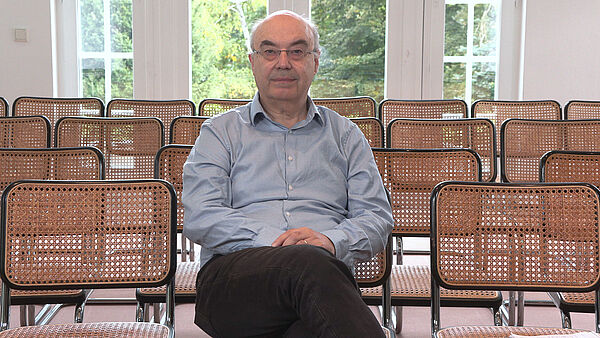
David Edgerton, PhD
Hans Rausing Professor of the History of Science and Technology, Professor of Modern British History
King’s College London
Born in 1959 in Montevideo
BA in Chemistry from the University of Oxford, PhD in History from Imperial College London
Arbeitsvorhaben
A Global History of Production
My project, a global history of production since 1900, must seem to be both impossible and unnecessary. Surely, we have more than enough knowledge on the topic, so much indeed that it is impossible to synthesize it in a single volume. To the contrary, I argue that we do indeed believe this, but what we in fact have are trite exemplars of poorly specified theories. These are the vital but unexamined foundations of nearly every social scientific or humanistic account of the twentieth-century world. Examples might include the idea of the second and (to a lesser extent) subsequent industrial revolutions, or the invocation of the concept of Fordism or mass production. These ideas are so common and used with such authority that they seem to explain much, yet they (and others) are empirically and theoretically very deficient ideas. Of particular surprise is that Marxism, the production-based account par excellence, has produced no significant work on production since Capital, with the partial but important exception of 1970s and 1980s work on the labour process.My aim is to make us more modest about our knowledge of production while at the same time increasing it. I want to paint a reasonable empirical picture, which requires archival research, of the main lines of development of production, of the “how” of production in particular. My aim is to sketch the development of agricultural, industrial, and domestic production, aiming to identify the most important trends while capturing the diversity that undoubtedly exists. The picture that emerges is radically different from the received one. For example, the assembly line stands out not because it is at the forefront of a generalised mechanisation (as it is supposed), but rather because it represents a particular element in production that has not been possible to mechanise. The Ford River Rouge assembly line is today much like it was in the 1930s, while the rest of the production system is very different. Assembling a car still needs many human workers; machining an engine, or making steel or plastic, does not.
My project is also genuinely global in scope, which in itself transforms our understanding of production. This is not only a means of getting away from very partial Eurocentric stories. Rather, a proper global history will radically change our understanding of the Eurocentre. This is important not least because so many accounts of modernity (with associated accounts of production) assume we know the story of the Eurocentre, but debate whether it is applicable to the rest of the world, with many invoking alternative modernities to modernities that exist only in theory, not in reality.
Recommended Reading
Edgerton, David. The Shock of the Old: Technology and Global History since 1900. London: Profile, 2006. Paperback with a new introduction 2019.
–. Warfare State: Britain, 1920–1970. Cambridge: Cambridge University Press, 2006.
–. The Rise and Fall of the British Nation: A Twentieth-Century History. London: Penguin, 2019.
Kolloquium, 08.10.2024
The History of Production is More or Less Bunk
“History is more or less bunk.”
Henry Ford, 1916
My aim in this talk is to examine the first thing we all know about the history of production in the twentieth century. It is that for most of the mid-twentieth century, a period of astonishing growth and transformation, the economy was based on something called mass production (or Fordism), which was exemplified/based on the continuous assembly line, pioneered by the Ford Motor company in 1913/14. No historical documentary, no general history book, nor indeed specialist works on economic history, the nature of work and so on, fails to give it a starring role. It stands for mechanisation, automation, the degradation of work and more, which are taken to be fundamental to the radical transformation in productivity which remade the world in the last century. I will show that even specialised historians of Fordism sustain the centrality of the assembly line, not only to Ford, but to the modern world. I will discuss a radical debunking of this argument by Williams et al, and take this critique further, showing that the assembly line was not only much less important than claimed, but that the assembly line should in fact stand not for mechanisation and automation but is rather exemplary of a set of processes that could not be mechanised or automated, and relied entirely on human work. I also show that Henry Ford and his paid propagandists did not themselves highlight the assembly line, but instead pointed to a whole range of other, typically neglected, factors central to his transformation of production. In exploring this famous case, I want to suggest that we need to be radically skeptical about what we take to be secure knowledge about the material constitution of the modern world.
Publikationen aus der Fellowbibliothek
Edgerton, David (Oxford [u.a.], 2023)
Edgerton, David (Oxford, 2021)
The nationallisation of British history : historians, nationalism and the myths of 1940
Edgerton, David (London, 2019)
The shock of the old : technology and global history since 1900 ; with a new introduction
Edgerton, David ([London], 2019)
The rise and fall of the British nation : a twentieth-century history
Edgerton, David (London, 2013)
England and the aeroplane : militarism, modernity and machines Penguin books
Edgerton, David (London, 2012)
Britain's war machine : weapons, resources and experts in the Second World War
Edgerton, David (Cambridge [u.a.], 2006)
Warfare state : Britain, 1920 - 1970
Edgerton, David (Cambridge [u.a.], 1996)
Science, technology and the British industrial 'decline', 1870 - 1970 New studies in economic and social history ; [29]
Edgerton, David (Basingstoke, Hampshire, England, 1991)
England and the aeroplane : an essay on a militant and technological nation Science, technology and medicine in modern history
